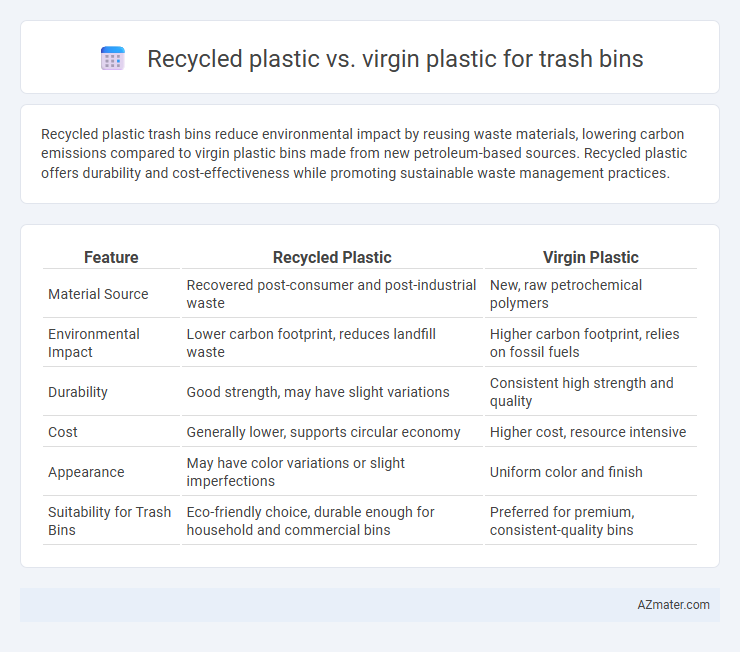Recycled plastic trash bins reduce environmental impact by reusing waste materials, lowering carbon emissions compared to virgin plastic bins made from new petroleum-based sources. Recycled plastic offers durability and cost-effectiveness while promoting sustainable waste management practices.
Table of Comparison
| Feature | Recycled Plastic | Virgin Plastic |
|---|---|---|
| Material Source | Recovered post-consumer and post-industrial waste | New, raw petrochemical polymers |
| Environmental Impact | Lower carbon footprint, reduces landfill waste | Higher carbon footprint, relies on fossil fuels |
| Durability | Good strength, may have slight variations | Consistent high strength and quality |
| Cost | Generally lower, supports circular economy | Higher cost, resource intensive |
| Appearance | May have color variations or slight imperfections | Uniform color and finish |
| Suitability for Trash Bins | Eco-friendly choice, durable enough for household and commercial bins | Preferred for premium, consistent-quality bins |
Introduction: The Need for Sustainable Trash Bins
Recycled plastic trash bins significantly reduce environmental impact by utilizing waste materials and lowering carbon emissions compared to virgin plastic counterparts. Virgin plastic production relies heavily on fossil fuels and contributes to increased landfill waste, making recycled options a more sustainable choice. Selecting recycled plastic bins supports circular economy principles and promotes resource conservation in waste management systems.
What Are Virgin Plastics?
Virgin plastics are materials produced directly from petrochemical feedstocks without previous use or processing, ensuring high purity and consistent physical properties for manufacturing trash bins. These plastics offer superior strength, durability, and resistance to contaminants compared to recycled plastics, which may contain impurities affecting product performance. Selecting virgin plastic for trash bins guarantees reliable structural integrity and long-term use in various environmental conditions.
Understanding Recycled Plastics
Recycled plastics used in trash bins consist primarily of post-consumer and post-industrial materials, reducing the demand for virgin plastic derived from petroleum. These recycled materials undergo rigorous cleaning and processing to ensure durability and resistance to wear, making them suitable for daily waste disposal. Understanding the lifecycle and environmental benefits of recycled plastics highlights their role in minimizing landfill waste and lowering carbon emissions compared to virgin plastic alternatives.
Environmental Impact: Virgin vs. Recycled Plastics
Recycled plastic trash bins significantly reduce environmental impact by lowering landfill waste and conserving natural resources compared to virgin plastic, which relies on raw petroleum extraction and results in higher carbon emissions. Manufacturing recycled plastic uses up to 70% less energy and emits fewer greenhouse gases than producing virgin plastic. Choosing recycled plastic bins supports circular economy efforts and minimizes ecological footprint associated with plastic waste.
Durability and Lifespan of Trash Bins
Recycled plastic trash bins offer comparable durability to virgin plastic bins, as modern manufacturing processes enhance the strength and resilience of recycled materials. Virgin plastic generally provides a longer lifespan due to its higher purity and resistance to environmental stressors such as UV exposure and physical wear. However, high-quality recycled plastic bins can achieve extended usability with proper maintenance, making them a sustainable alternative without significantly compromising durability.
Cost Comparison: Production and Purchase
Recycled plastic trash bins typically offer a cost advantage over virgin plastic due to lower raw material expenses and reduced energy consumption during production. Virgin plastic bins incur higher costs from the extraction and processing of new petrochemical resources, impacting both production and retail prices. Purchasing recycled plastic bins supports budget-friendly waste management solutions while promoting environmental sustainability.
Design and Aesthetic Differences
Recycled plastic trash bins often feature a slightly textured surface and muted colors due to the blending of various plastic types, which can result in a more matte and organic finish compared to the consistently smooth and vibrant appearance of virgin plastic bins. The design flexibility of virgin plastic allows for sharper edges, intricate patterns, and glossy finishes, enhancing aesthetic appeal for modern or high-end interiors. Recycled plastic's natural imperfections provide a unique, eco-friendly look preferred in rustic or industrial designs, emphasizing sustainability alongside functionality.
Safety and Chemical Concerns
Recycled plastic trash bins often contain fewer harmful additives compared to virgin plastic, reducing exposure to toxic chemicals like BPA and phthalates. However, contamination risks during recycling can introduce impurities that may compromise safety and durability. Virgin plastics offer consistent purity and strength but may release volatile organic compounds (VOCs) and other hazardous substances during production or degradation.
Market Trends and Consumer Preferences
The market for trash bins shows a rising preference for recycled plastic due to increasing environmental awareness and sustainability commitments among consumers and manufacturers. Recycled plastic bins offer competitive durability and cost-effectiveness compared to virgin plastic, driving growth in eco-friendly product segments by approximately 15% annually. Consumer demand for circular economy products is influencing retail trends, with recycled plastic trash bins gaining traction in urban and commercial sectors.
Choosing the Right Plastic for Trash Bins
Recycled plastic trash bins offer enhanced environmental benefits by reducing plastic waste and conserving natural resources compared to virgin plastic alternatives. Virgin plastic bins typically provide higher durability and consistent quality, making them suitable for heavy-duty or long-term use. Selecting the right plastic depends on balancing sustainability goals with performance requirements, where recycled plastics excel in eco-friendliness and virgin plastics lead in strength and longevity.

Infographic: Recycled plastic vs Virgin plastic for Trash bin
 azmater.com
azmater.com